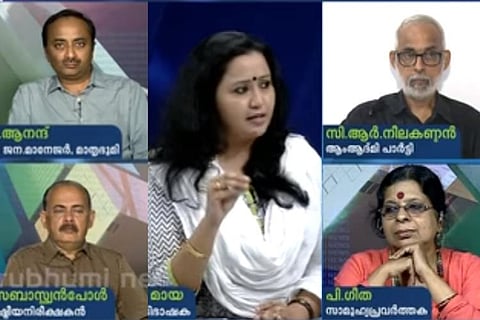

Mediapersons in Kerala were taken aback when news broke out that police had arrested journalist and Senior Editor of Mathrubhumi News, Amal Vishnudas, on Wednesday. The journalist was arrested on the basis of a complaint by his subordinate that he had sexually harassed her multiple times after promising to marry her.
Almost immediately, many began to ask if the media will dissect this case just as they had done with actor Dileep, and in other cases of sexual assault and rape. Without shying away from the issue, Mathrubhumi News discussed the arrest and the laws governing sexual harassment at workplaces.
The show, titled 'Super Prime Time' and hosted by Mathrubhumi editor Venu Balakrishnan, featured a panel of legal experts, activists and representatives. In the course of an hour-long debate, the panelists spoke at length about the need to speak out about sexual harassment, and the role of the Vishakha Committee in organisations.
The show kicked off with Venu asking Mathrubhumi's HR Manager G Anand on why they chose to suspend Amal Vishnudas. Anand explained that since the woman employee had not approached the management with a complaint, the only action that Mathrubhumi could take as an organisation was to suspend him pending inquiry.
When P Geetha, a social activist, asked why the company had limited itself to a suspension, Anand replied that the management were still to hear all sides of the story, before further action could be taken.
Geetha also pointed out that television channels in Kerala had played a major role in recruiting women and bringing them into the limelight. "We can be relieved that women are willing to come forward and file complaints (in cases of sexual harassment)," she added.
AAP State Convenor CR Neelakandan also appreciated the fact that workplaces like Mathrubhumi News were willing to bring out issues like sexual harassment into the open. “It is important that in workplaces people are ready to acknowledge that sexual harassment is a problem. And it is worth appreciating that the media is discussing an internal issue like this, unlike what AMMA did by clamming up on the whole issue of the actor’s abduction,” he said.
With most of the panelists, Mathrubhumi News received appreciation for its willingness to take immediate action and also to publicly debate the issue on its own channel.
However, Advocate V Maya struck a discordant note on the question of why the woman employee had chosen to approach the police directly instead of the Mathrubhumi management, by suggesting that perhaps women complainants could fear getting into disfavour with the management.
Anand spoke of Mathrubhumi’s responsiveness, pointing out that the company had been one of the first media houses to adopt the Vishaka Committee guidelines and to constitute its Internal Complaints Committee (ICC).
He cast the issue as a serious offence, and not essentially a question of workplace harassment. He also added that the ICC was a wholly independent body, and said that women should not fear bias from the ICC. However, Maya countered that the complete independence of an ICC could not be guaranteed as one or more members would be from the organisation. And this could generate some fear among complainants that their careers could be affected.
The panelists then went on to discuss various provisions of the Vishaka Committee guidelines, including a discussion at length about the question of misuse of the law.
Interestingly, even as the hour-long debate centred entirely on the case of Amal Vishnudas, his name was never raised, and he was only referred to as the male employee against whom a complaint had been made.